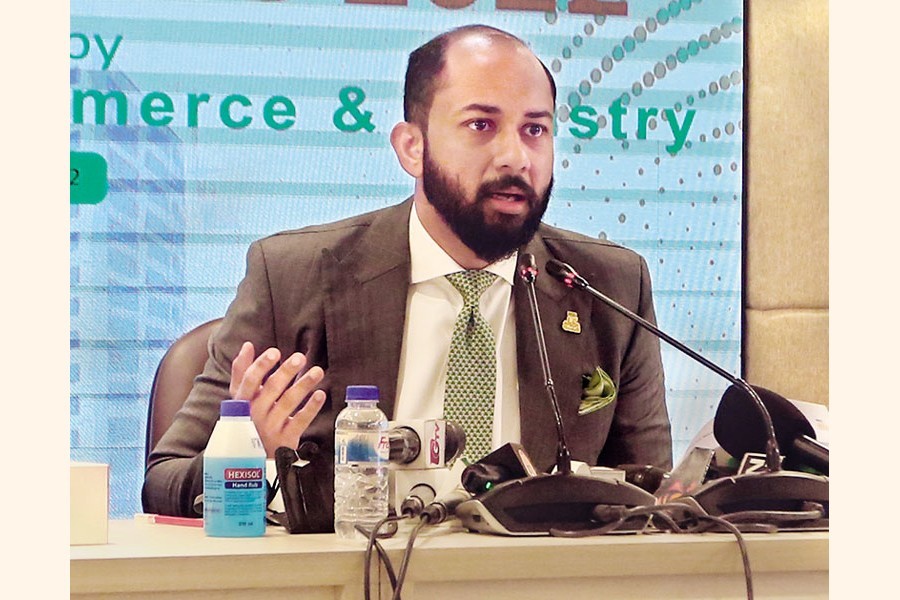Policy overhaul, curriculum update to raise technology-proficient workforce and ensuring feel-good business ambience are essential to cope with the new-era economic challenges Bangladesh will confront, says a leading chamber.
 The Dhaka Chamber of Commerce and Industry, while rolling out its next work plan at a press conference Sunday, said the challenges would be stemming from Bangladesh's graduation from the least-developed country (LDC) status, the fourth industrial revolution (4IR) and digitisation.
The Dhaka Chamber of Commerce and Industry, while rolling out its next work plan at a press conference Sunday, said the challenges would be stemming from Bangladesh's graduation from the least-developed country (LDC) status, the fourth industrial revolution (4IR) and digitisation.
It stressed the urgency of forging academia-industry linkage for raising workforce skilled in dealing with the emerging economic needs through curricular update.
Speaking at the press conference, DCCI President Rizwan Rahman said potential human resources could be created by increasing investment in education, research and development.
"Substantial economic income could be generated through equipping the young workforces with proper skills and strengths," he adds.
Collaboration between the industries and academia to update and redesign education curriculum will help improve labour force as per demand of the market, he said at the briefing at the Chamber's city office.
The DCCI chief also sought tax break to encourage research and development in R&D.
Placing the chamber's annual agenda, he said that they would prioritise the CMSME sector, export diversification, blue economy, economic diplomacy, infrastructure, private investment and foreign direct investment (FDI), export diversification, skill development, digital engagement, taxation and LDC graduation this year.
Mr Rahman feels that developing a comprehensive policy framework by revisiting the definition of CMSME, separating medium from the CMS, would help growth of the sector.
As the world is still reeling from Covid fallout, he notes, strengthening the CMSME sector should get priority, especially in terms of easy access to finance.
Terming blue economy as an emerging sector for Bangladesh, he said that the country's ocean economy could account for 3.1 per cent of its gross domestic product (GDP).
Shipbuilding, tourism, fishing and mineral exploration, including gas, largely remains unutilised, Mr Rahman points out about the economic potential.
He, however, urged the government to create a roadmap for development of the national blue economy.
To have a strong position in the economic diplomacy, he suggests developing negotiating skills on international trade, WTO matters and relevant international laws for striking win-win FTAs and PTAs.
"Our major export destinations are Europe and America that cover almost 67 per cent of our total exports whereas Africa and the Middle East are untapped," he told the press.
"But after the LDC graduation export will face a challenge and for that we have to formulate export-diversification strategy engaging all stakeholders," he added.
Tariff rationalisation, reduction in non-tariff barriers in cross-border trade and minimising anti-export bias are also important in this regard, he said.
In 2020, private investment came down to 21.25 per cent of GDP but in 2021 FDI was US$ 2.51 billion.
In order to rejuvenate private investment and foreign direct investment (FDI), the trade body suggests rationalising corporate-tax structure, equipping economic zones and preparing a national roadmap.
It also stressed automation of overall taxation, value-added tax (VAT), audit, arrears management, investigation and inquiry, appeal, revenue account management, taxpayer-account management and revenue-information management.
The DCCI thinks a predictable and compliant tax culture would increase tax net and foreign investment.
It further underscores the importance of simplified VAT-refund process.
For a smooth LDC-graduation process, Rizwan Rahman emphasised improvement in the country's competitiveness, rational elimination of non-tariff barriers and formulating strategies for local-and export-market competitiveness.
Replying to a question, he said that automation could remove corruption and hassles as well as ensure transparency and accountability.
Regarding corporate tax, he said that DCCI still advocated for reducing corporate-tax rates to progressive rates of 5 per cent and 7.5 per cent respectively in the 2022-23 and 2023-24 and it should be on a par with the regional average tax rate.
"After LDC graduation our cost of doing business will increase, tariff will increase at least 6 to 7 per cent, so we should look into diversified products as well as diversified export market," he says.
Regarding smooth disbursement of stimulus packages, especially to the SMEs, he said that if Bangladesh Bank specified the percentage of loan that CMSMEs should get, the banks must have done it accordingly.
Replying to a question about alleged harassment by the tax officials, he said that automation was the solution and also suggested the formation of an Accountability Commission following the PPP model.
Regarding the signing of PTA and FTA ahead of the LDC graduation, he said, "FTA is more effective and beneficial than PTA. So we should try to focus more on signing FTA."
He adds: It is heartening that the government allows offshore equity investment but it should be more open, not only for ERQ (Export Retention Quota) but for the non-ERQs, too.


